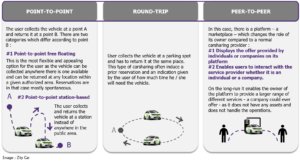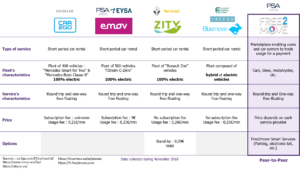Big cities face the impact of air pollution in both climate and public health. The carsharing concept came out of the transition from a product-based to a service-based offer. This concept also enables cities to rearrange traffic flow and to improve the air quality in overly crowded areas such as touristic, commercial and business centres. In this context, it is worth mentioning Madrid’s carsharing offer, whose success was made possible by a few specific factors.
Key notions about carsharing
What is carsharing?
Carsharing is a short-term car rental service from point A to point B. It is a pay-per-use type of service and companies bill the user his or her monthly usage of the service. The main value proposition of carsharing is that it allows users to enjoy the benefits of owning a car without all its hassles.
How does it work?
There are three main carsharing models that can be identified: Point-to-Point free floating, Point-to-Point station based and Round-Trip. There is also a fourth possibility, Peer-to-Peer, but one would not consider it as a main carsharing model.

Madrid: a success story
Car manufacturers and traditional car rental services have started to rethink their business model around the concept of mobility. Both French giants, PSA and Renault, have teamed up with major actors of the public infrastructure and mobility sector to tackle Madrid’s carsharing market. As of today, the available carsharing services are:

Key Success Factors

Between 2008 and 2011, the European project “More Options for Energy Efficient Mobility” (MoMo Carsharing from now on) identifies the main strengths and opportunities for any carsharing provider, based on a study on carsharing success factors. According to the research, those factors are:
- To have the support of the local and national authorities
- To provide the appropriate kind of vehicles
- To enable users to have access to parking spots in strategic places
- To offer strong value proposition and have strong technology command
Both points 2 and 3 can be achieved through partnerships, which is the case of the joint-ventures made by PSA+EYSA and Renault+Ferrovial.
Madrid’s strategy to improve the air quality of the city
Like many other capital cities, Madrid faces air quality problems. In response to this situation, the city council presented in March 2017 the Plan A de Calidad del Aire y Cambio Climático (in English: Plan A of Air Quality and Climate Change) in which an entire chapter is dedicated to carsharing. The city council recognizes it as one of the solutions which could help to reduce the traffic flow in the city centre as they state that today in Spain one shared vehicle could replace eight individual cars.
The Plan A should be completed by 2020 and it disposes of a 544 million € budget to implement a total of 30 measures aiming at improving air quality in the city and protect the health of its 3 million citizens. It pursues the national and local actions undertaken by the “Air Quality Strategy” which aimed at responding to the requirements set by the 1996/62/CE. This plan encourages citizens to reduce their carbon footprint, by offering -for instance- discounts on parking fees up to 100% for electric cars and up to 50% for less but still environment-friendly cars. It also comprises the gradual introduction of anti-polluting measures such as limitations for parking and areas’ access by delimiting a specific zone named Área Central Cero Emisiones (in English, Zero Emission Centric Zone) in the middle of Madrid’s city centre which will be closed to vehicles which do not comply with the DGT requirements starting from November 2018.
The final goal of these actions is to “impose a new culture of mobility”.
Madrid’s strategy is therefore beneficial to companies which have decided to select electric vehicles for their carsharing fleet.
However, working according to city halls’ directives may be identified as a challenge for car manufacturers which are used to working under national and European authorities’ guidance. To overcome this problem, they teamed up with companies operating in the mobility and public infrastructure management through joint-ventures, as these companies are used to respond to city hall’s requirements.
The carsharing service meets users’ needs and expectancies
There are different kinds of carsharing services and distinctions between them are important as they impact the user experience and can make operations complex to run on a daily basis. The most appealing model for users is the point-to-point free-floating model as it enables them to pick a car near their location and to return it at any point within the authorized area. Companies usually offer this type of service even though it makes it harder to keep a high-level vehicle availability ratio in some secluded areas as users tend to head for the same locations. In Paris, Autolib’ encouraged their users to contribute to relocate cars to empty stations in exchange for free minutes.
Moreover, car models are adapted to an urban use as they are small which enables to easily find parking spots even in areas constrained by space but also as they use electricity which, in Madrid, enables to circulate everywhere and to have access to free parking spots.
Finally, to differentiate from the competition, some carsharing providers offer additional services such as a stand-by option enabling to keep a reservation even when stepping out of the vehicle for a few minutes.
Carsharing services: a good value for money
Users promptly adopted carsharing solutions as providers currently record a daily car usage frequency between 13 and 15 compared to only 5 in Paris. In fact, many have found in carsharing a good opportunity to ditch the fixed cost induced by the possession of car and have replaced them with a single monthly bill, pure variable expenses. Households naturally leaned toward this type of transportation solution as the Spanish labour market still counts 15% of the population as unemployed in Spain and 12% in Madrid compared to 9% in France and 7% in Paris. Furthermore, young workers (from 20 to 29 years old) suffer from involuntary part-time conditions which tends to create insecurity.
These factors make of Madrid an environment suited for the development and growth of carsharing services. Thanks to the explicit support of the local authorities and to a marketing mix suited for the needs of the targeted population, the first companies that have entered the market have gained rapid growth over the past years. Today, companies are looking to expand the success story to other European capital which experience the same mobility and air quality issues.
Sources:
- El País
- Ayuntamiento de Madrid
- Organismes nationaux de statistiques : INE& INSEE
- Le Figaro
- Imperial College of London (Publication, PDF)
- La Commission Européenne (Publication, PDF)
- Le Comité des Constructeurs Français d’Automobile
- Site ”Corriente Eléctrica” édité par Renault Espagne
